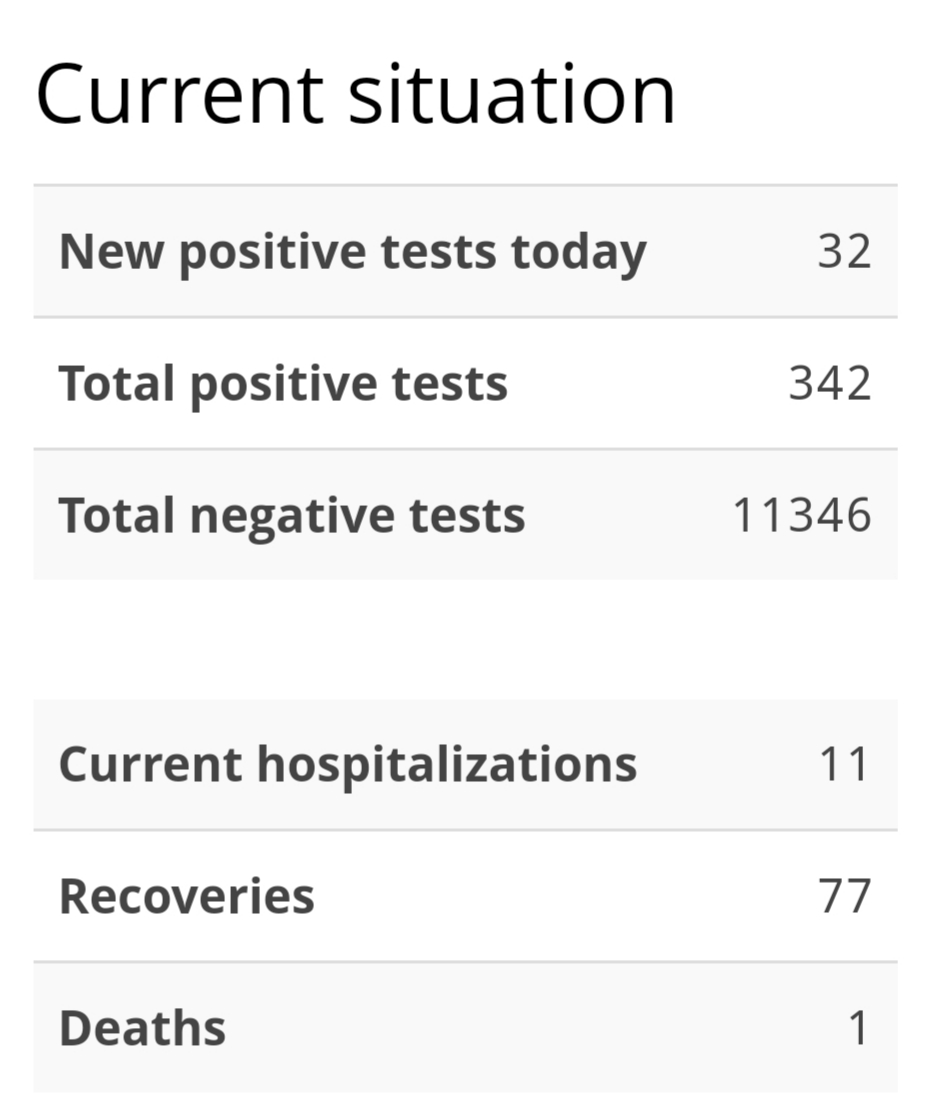**** HEALTH/WELLNESS Media Release
Thirty-two New Cases of COVID-19 in Nova Scotia

—————————————————————
Premier Stephen McNeil and Dr. Robert Strang, Nova Scotia’s chief medical officer of health will provide an update today, April 8, at 3 p.m.
This update will be livestreamed on http://novascotia.ca/stayinformed/webcast .
—————————————————————
As of today, April 8, Nova Scotia has 342 confirmed cases of COVID-19. Thirty-two new cases were identified Tuesday, April 7.
The QEII Health Sciences Centre’s microbiology lab completed more than 700 Nova Scotia tests on Tuesday, April 7 and is now operating 24 hours.
While most cases in Nova Scotia have been connected to travel or a known case, there is now community spread. That is why travel has been removed as a requirement for testing for COVID-19.
The list of symptoms being screened for has also expanded. If you have two or more of the following symptoms, visit http://811.novascotia.ca/ to determine if you should call 811 for further assessment:
— fever
— new or worsening cough
— sore throat
— runny nose
— headache
To date, Nova Scotia has 11,346 negative test results, 342 positive COVID-19 test results and one death. Confirmed cases range in age from under ten to over 90. Eleven individuals are currently in hospital, five of those in ICU. Seventy-seven individuals have now recovered and their cases of COVID-19 are considered resolved. Cases have been identified in all parts of the province. A map and graphic presentation of the case data is available at http://novascotia.ca/coronavirus/data .
Public health is working to identify and test people who may have come in close contact with the confirmed cases. Those individuals who have been confirmed are being directed to self-isolate at home, away from the public, for 14 days.
Anyone who has travelled outside Nova Scotia must self-isolate for 14 days. As always, any Nova Scotian who develops symptoms of acute respiratory illness should limit their contact with others until they feel better.
It is now more important than ever for Nova Scotians to strictly adhere to the public health orders and directives – practise good hygiene, maintain a physical distance of two metres or six feet from others, limit essential gatherings to no more than five people and stay at home as much as possible.
.
**** HRM Media Release
Response to COVID-19: Municipal service updates
The Halifax Regional Municipality continues to monitor and respond to the rapidly evolving effects of COVID-19.
The municipality is committed to taking important steps in reducing the spread of COVID-19.
The following is an update on municipal services.
Municipal Budget
- A number of the measures the municipality has taken to protect our staff and the public, as well as support businesses, has resulted in a decrease to revenue. Bus fares from Halifax Transit alone are around $3 million per month. By adding forgone parking revenue and rent deferrals we are seeing material changes to the budget.
- Finance staff are assessing the operating and capital budget to see what can be delivered this year, and what can be deferred. We are also continuing to have conversations with the province about infrastructure spending and the possibility of stimulus programs. It is anticipated that staff will be back with a recast budget in late May, but as with all things COVID-19 related, that timeline is subject to change.
Tax Deferral
- The municipality continues to work the Nova Scotia Federation of Municipalities and the Association of Municipal Administrators on options for a tax deferral program to help businesses and individuals that have been impacted by COVID-19. Finance staff will present a report to Regional Council for consideration on April 14.
- It is critical that those who can pay their taxes continue to do so in a timely fashion. Tax revenue makes up 82% of the municipality’s revenue. Operating expenses total approximately $100 million per month and, while the municipality is financially sound, a significant amount of cashflow is required to provide services, pay vendors and suppliers and continue with capital projects that support the economy.
Domestic Violence
- The municipal Public Safety Office is advising residents that help is available for those experiencing or at risk of domestic violence. Following public health direction to stay home is crucial, but we know, that home is not always safe for everyone.
- Available help for women and their children takes many forms, from supportive connections and outreach over the phone, information about safety planning and resources, to provision of emergency shelter and second-stage housing. In Halifax, organizations serving women continue to offer a wide range of support, guidance, and shelter to women and their children during this time.
- If you are experiencing domestic abuse, know that you are not alone. There’s help available to you.
- If you’re in immediate danger, call 911.
- If you need help or information, you can call Bryony House’s distress line at 902.422.7650.
- To connect with community resources in Halifax, call 211 or visit their website.
hfxALERT
- To stay informed about emergencies and operations updates residents are encouraged to register for hfxALERT, the municipality’s new mass notification system. Subscribers will receive urgent and non-urgent notifications by phone, email, and/or text message.
For more information on municipal services during the COVID-19 pandemic, visit Halifax.ca/coronavirus.
Thank you for helping with the community effort to reduce the risk of spreading COVID-19.
Nova Scotians can find accurate, up-to-date information, handwashing posters and fact sheets at http://novascotia.ca/coronavirus .
Today’s update will be livestreamed at 3 p.m. on http://novascotia.ca/stayinformed/webcast , @nsgov Facebook and YouTube channels.
Quick Facts:
— testing numbers are updated daily at http://novascotia.ca/coronavirus
— a state of emergency was declared under the Emergency Management Act on March 22 and extended to April 19
— there are 22 primary assessment centres in Nova Scotia: 21 operated by Nova Scotia Health Authority (NSHA) and one operated by the IWK Health Centre, temporary primary assessment centres are operating in two communities
— two mobile assessment centres are being established by NSHA to do community-based testing; Emergency Health Services operates two field assessment units, one in Halifax Regional Municipality and one in Cape Breton Regional Municipality
— the first death in the province was on April 6 – a woman in her 70s with underlying medical conditions died in hospital in the Eastern Zone as a result of complications related to COVID-19
Additional Resources:
Government of Canada: http://canada.ca/coronavirus
Government of Canada toll-free information line 1-833-784-4397
The Mental Health Provincial Crisis Line is available 24/7 to anyone experiencing a mental health or addictions crisis, or someone concerned about them, by calling 1-888-429-8167 (toll free).
Kids Help Phone is available 24/7, by calling 1-800-668-6868 (toll-free).




